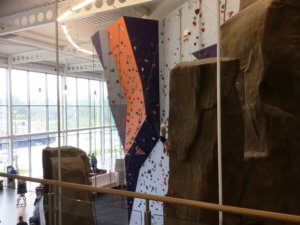 The Construction Industry Council (CIC) has announced the shortlist for the 2017 Inclusive Environment (CIC-IE) Award, the winner of which will be announced at private reception on 25 October 2017.
The Construction Industry Council (CIC) has announced the shortlist for the 2017 Inclusive Environment (CIC-IE) Award, the winner of which will be announced at private reception on 25 October 2017.
This annual “award of awards”, now in its second year, celebrates exemplar schemes and projects previously recognised by a CIC member professional body or a CIC member built environment stakeholder. The CIC-IE Award recognises buildings, places and spaces which demonstrate best practice in achieving an inclusive environment – an environment which is safe, flexible and accessible for all.The aim is to inspire professionals to help raise the standard of inclusivity achieved across the industry. This years award has been kindly sponsored by Gardiner & Theobald. The shortlisted entries are:
Francis Crick Institute
The Francis Crick Institute is a ground‐breaking, global‐leading biomedical discovery institute dedicated to understanding the fundamental biology underlying human health and illness. The vision was that the Crick would be a new type of biomedical research institute with an uncompromising commitment to excellence, an emphasis on multidisciplinary research, focusing on young and emerging talent and leading the way in novel ways of partnership working. By combining specialist knowledge, expertise and resources the Crick undertakes ground‐breaking research across a range of scientific disciplines and helps laboratory discoveries to be turned into treatments as quickly as possible; truly delivering the concept of ‘from bench to bedside’. At the heart of local engagement activities is the Living Centre, run by a group of community organizations, it provides space for a range of affordable services to help improve health and wellbeing.
Stihl Treetop Walkway
The Arboretum is in the care of the Forestry Commission and is a major destination containing one of the most significant tree collections in the world. The brief here was to create high level access to the tree tops via a walkway. The walkway reaches a height of almost 14 metres and extending for some 300 metres creates an ambulating walk through the tree tops that connects disparate parts of the extensive site. The walkway is accessed and exited at the same grade – there are no steps or lifts along the route making it easilyaccessible to all users, the strength of the project that is enhanced by its sinuous form and gentle gradients.
Wycombe Leisure Centre (pictured)
The previous sports centre was built at a time when providing sports facilities for those with disabilities was not given much thought. The design brief was to make the new leisure centre as inclusive as possible for all members of the community of Wycombe District and beyond. The centre was keen to implement much of the Sport England design guidance to encourage greater participation in sport. Due to the desire to host disability sports events, much attention was given to improve the standards achieved on accessibility for both participants and spectators. Facilities include a fully accessible indoor bowling green, squash courts, a climbing wall accessible to disabled children, a Changing Places WC, a pool with a movable floor and good viewing positions for wheelchair users overlooking the pool.
CIC Chairman Professor John Nolan, commented: “I am delighted to once again be on the Inclusive Environment Award judging panel, now in its second year. It is wonderful that the number of entries has doubled this year and we hope the award continues to grow. The Award entries show buildings, places and spaces which exhibit best practice in achieving an inclusive environment – an environment which is safe, flexible and accessible for all.”
The Judging Panel comprised of Eoin Burns – Willmott Dixon, Tony Burton – Gardiner & Theobald, Clare Devine – CABE Design Council, Mark Dyer – High Speed Two (HS2) Ltd, Julie Fleck – CIC BEPE Project Lead, John Nolan – Nolan Associates, Rachel Smalley – Access Association and Danna Walker – Built By Us.

